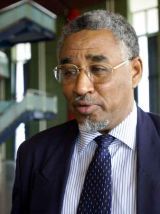UN envoy chides Darfur negotiators for lack of urgency
By Opheera McDoom
KHARTOUM, Oct 27 (Reuters) – Warring parties in Sudan’s western Darfur region are showing no urgency in the search for a political solution to a 20-month-old rebellion, the top U.N. envoy in Sudan said on Wednesday.

|
|
Magzoub El Khaliffa Ahmed, Sudan’s Minister of Agriculture and Forestry and head of Sudan’s delegation, talks with the media after peace talks with rebels in Abuja, Nigeria October 27, 2004. African Union (AU) -sponsored talks between the rebels and the government have stalled in Abuja after rebels insisted that the government must disarm its militias in Darfur before they would sign a deal to bring aid to the refugees. |
Jan Pronk told reporters in Khartoum that a vicious circle of violence in Darfur could cause the collapse of a ceasefire signed in April between two rebel groups and the government.
“What is lacking is a sense of urgency … the commitment to do it (reach an agreement) as soon as possible,” he said.
Government and rebel delegates filed into African Union-sponsored talks in Nigeria on Wednesday, but for a third consecutive day rebels called for an adjournment within an hour of the start of talks.
Observers said the two rebel groups, who have flown in from isolated locations across Africa, were still formulating their position at the talks, aimed at ending the conflict that has displaced more than 1.5 million people.
The government expressed impatience at the stalling tactics.
“We feel they are wasting our time and I think we have been patient enough. I think this should be their last chance to show whether they are ready to negotiate,” said government spokesman Ibrahim Mohammed.
The United Nations says Darfur is one of the world’s worst humanitarian crises, which has killed around 70,000 people through disease and malnutrition since March. There are no reliable figures for how many people have died due to fighting.
Pronk added that a U.N. Security Council resolution demanding the violence stop in Darfur and a humanitarian protocol drawn up in April meant the two sides need not discuss the issues of aid access and security, which had stalled the previous round of talks in Abuja and continued to block progress in the Nigerian capital this week.
“Don’t discuss it anymore — just do it so that you can discuss political issues, political objectives,” he said.
REBEL STICK TO POSITION
The Sudan Liberation Army, the main rebel group, insisted on Wednesday that the government must agree to disarm militia before they would be ready to discuss political issues.
After years of skirmishes between Arab nomads and mostly non-Arab farmers over scarce resources in arid Darfur, rebels took up arms accusing Khartoum of neglect and of using mounted Arab militias, known as Janjaweed, to loot and burn non-Arab villages.
Khartoum denies any link to the Janjaweed, calling them outlaws. The United Nations has threatened Sudan with possible oil industry sanctions if it fails to stop the violence, which the United States has described as genocide.
Pronk, who leaves on Wednesday for New York to give a monthly briefing on Darfur, said ordinary civilians and aid workers were suffering as talks dragged on.
“Insecurity and violence and violation of human rights is on the rise … we are hardly able to stop it and parties do not seem to be willing to stop it on the ground,” he said, adding rebels and not the government were impeding aid access to the diseased, hungry and destitute refugees.
Pronk warned if the talks in Abuja did not make progress, the ceasefire, which each side has accused the other of breaking, could collapse in Darfur.
“It is officially still a ceasefire, but in practice there are constant attacks,” he said.
Rebels said 26 civilians died in a bombing raid on Wednesday morning in Allaiet, in eastern Darfur, but the government said the attack happened three days ago, that its forces were only responding to a rebel attack and that those killed were rebel fighters.
(Additional reporting by Opheera McDoom in Khartoum)
